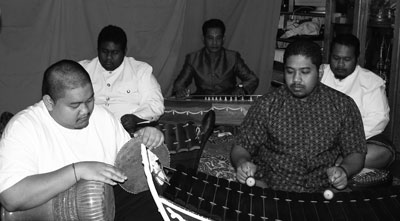
Sambath Pich
Cambodian raneat ek
 The roneat ek is a xylophone used in the Khmer classical music of Cambodia. Made of wood or bamboo, it is built in the shape of a rectangular boat. It is a leading instrument in both the Pin Peat and Mahori musical genres, used to harmonize classical Khmer music ensembles as a whole.
The roneat ek is a xylophone used in the Khmer classical music of Cambodia. Made of wood or bamboo, it is built in the shape of a rectangular boat. It is a leading instrument in both the Pin Peat and Mahori musical genres, used to harmonize classical Khmer music ensembles as a whole.
Pin Peat music is said to have originated upon the first Buddha’s death, when angels came to earth to play music called pin. Pin Peat is still played today during traditional Buddhist ceremonies. There are over 250 melodies in this genre of Khmer classical music.
Mahori music, which contains over 1,000 melodies, has a lighter melody and is played during Khmer folk dances, royal banquets, traditional events, and other forms of entertainment. Traditionally, neither Pin Peat or Mahori have a system of notation and melodies must be played from memory.
Master musician Sambath Pich began playing the roneat ek at the age of 10, learning from his grandfather, Los Sourn Mar, a musician in Cambodia’s royal court from 1890 to 1975. Sambath is one of the few Khmer musicians that survived genocide during the Khmer Rouge. He immigrated to the U.S. in 1984 and began teaching Cambodian classical music in Long Beach, the largest community of Cambodians immigrants outside Southeast Asia, in 1995.
Sambath participated in ACTA’s Apprenticeship Program in 2010 with his son and apprentice Samnang Pich. Sambath guided his son in mastering Mahori music, deepening his knowledge of the Mahori repertoire.
As a participant in ACTA’s Traditional Arts Development Program in 2005, Sambath offered instruction to his son, Sambo Pich, on the sralai thom, or “big oboe,” one of the primary instruments of the pin peat ensemble. Sambo Pich, who already has advanced training in several of the ensemble instruments, aspires to attain the level of training that will allow him to inherit his father’s and grandfather’s cultural legacies as traditional orchestral leaders.

